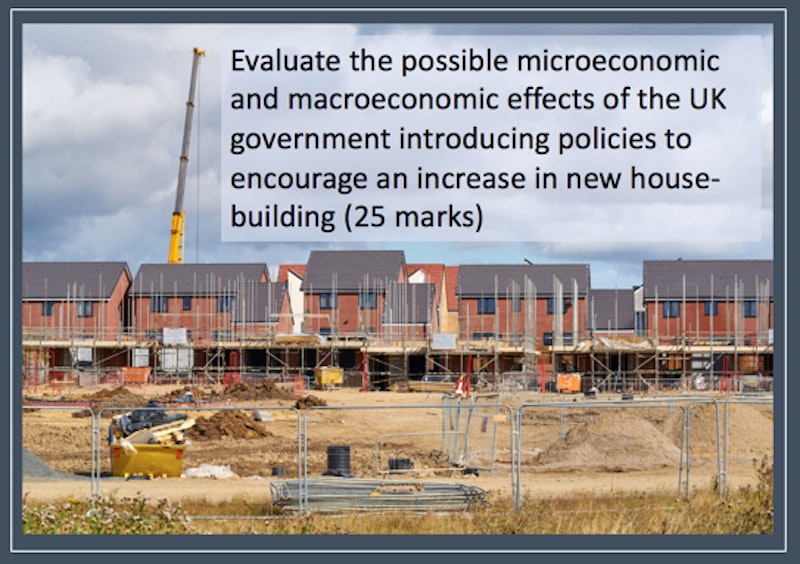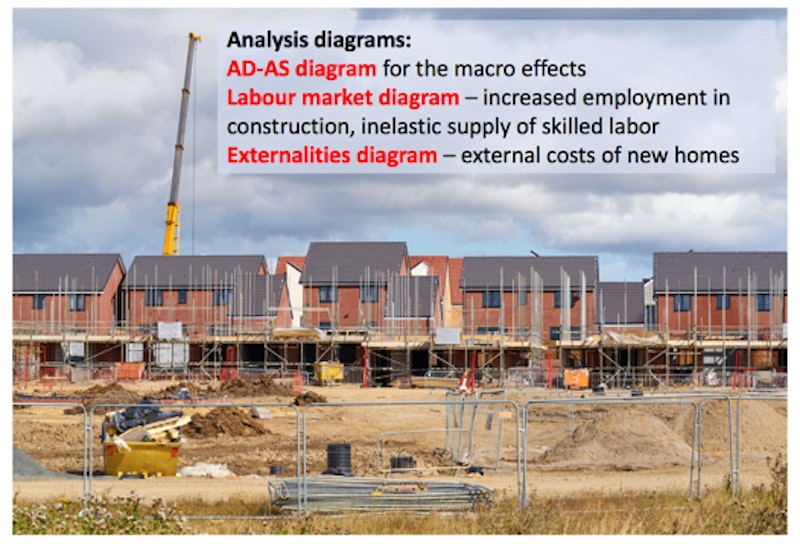Practice Exam Questions
Housing Supply (Revision Essay Plan)
- Level:
- A-Level
- Board:
- Edexcel
Last updated 15 Dec 2018
In this video we look at building an answer to a synoptic 25 mark essay question (Edexcel) on the micro and macro effects of an increase in house-building in the UK economy.

Here are the slides from the presentation
Micro point 1
An increase in new house-building will lower prices and therefore help to make property more affordable for home-buyers.
For example, eliminating VAT on building new homes on brownfield sites reduces costs for building firms and therefore make it more profitable to construct new homes. An increase in supply can bring down prices for home-buyers if the number of new homes exceeds the increase in demand for property.
Whether prices fall and makes housing more affordable depends on the other costs of building homes. The construction industry might be affected by skills shortages which leads to higher wage costs or higher costs caused by tougher building regulations such as meeting emissions targets.
Micro point 2
Increased house-building may lead to environmental damage which could then be a cause of market failure.
Building new homes can lead to external costs in the form of noise pollution and waste products. Building hundreds of new homes in a local area might negatively affect people already living there and lead to increased congestion on roads.
However a counter argument is that the local authority might insist on construction companies spending money on improving roads and also building new facilities for the local community as part of the planning process.
Macro point 1
Policies that successfully increase the rate of new house-building will help to stimulate UK economic growth in both the short and the long run.
This is because investment in new housing is a component of aggregate demand and is likely to lead to a strong multiplier effect as building is a labour-intensive industry. More homes also increases the geographical mobility of labour which will help to reduce the rate of unemployment in the longer term.
The size of the multiplier effect depends on whether the building industry is able to expand their labour force. They may face skills shortages which leads them to use workers who have migrated from overseas. Their remittances sent home would be a leakage from the circular flow of income.
Macro point 2
An increase in house-building will lead to a rise in government tax revenues which will help to bring down the fiscal deficit.
House-building companies will make more profits when new homes are sold and pay more corporation tax. More houses will also be bought and sold leading to an increase in revenue from Stamp Duty and VAT on building/DIY materials.
This macro effect depends on the extent to which building homes is actually profitable. Building firms might face higher costs (e.g. imported raw materials) which lowers the rate of return and cuts corporation tax liability.
Final reasoned comment:
There is substantial unmet demand for housing in the UK and a rise in new house-building is likely to provide significant micro and macro benefits. But the government needs to maintain a balance between homes available to buy and those offered for rent since new homes are unaffordable for many people.

You might also like
Labour Market Failure (Revision Presentation)
Teaching PowerPoints
De-Merit Goods (Revision Presentation)
Teaching PowerPoints

British Housing Crisis Threatens Economic Growth
3rd September 2015
Financial Market Failure (Financial Economics)
Study Notes
Benefits and Drawbacks of Rising House Prices
Topic Videos
Why do big government projects cost so much?
13th February 2020
4.1.8.3 Public and Private Goods (AQA A Level Economics Teaching Powerpoint)
Teaching PowerPoints